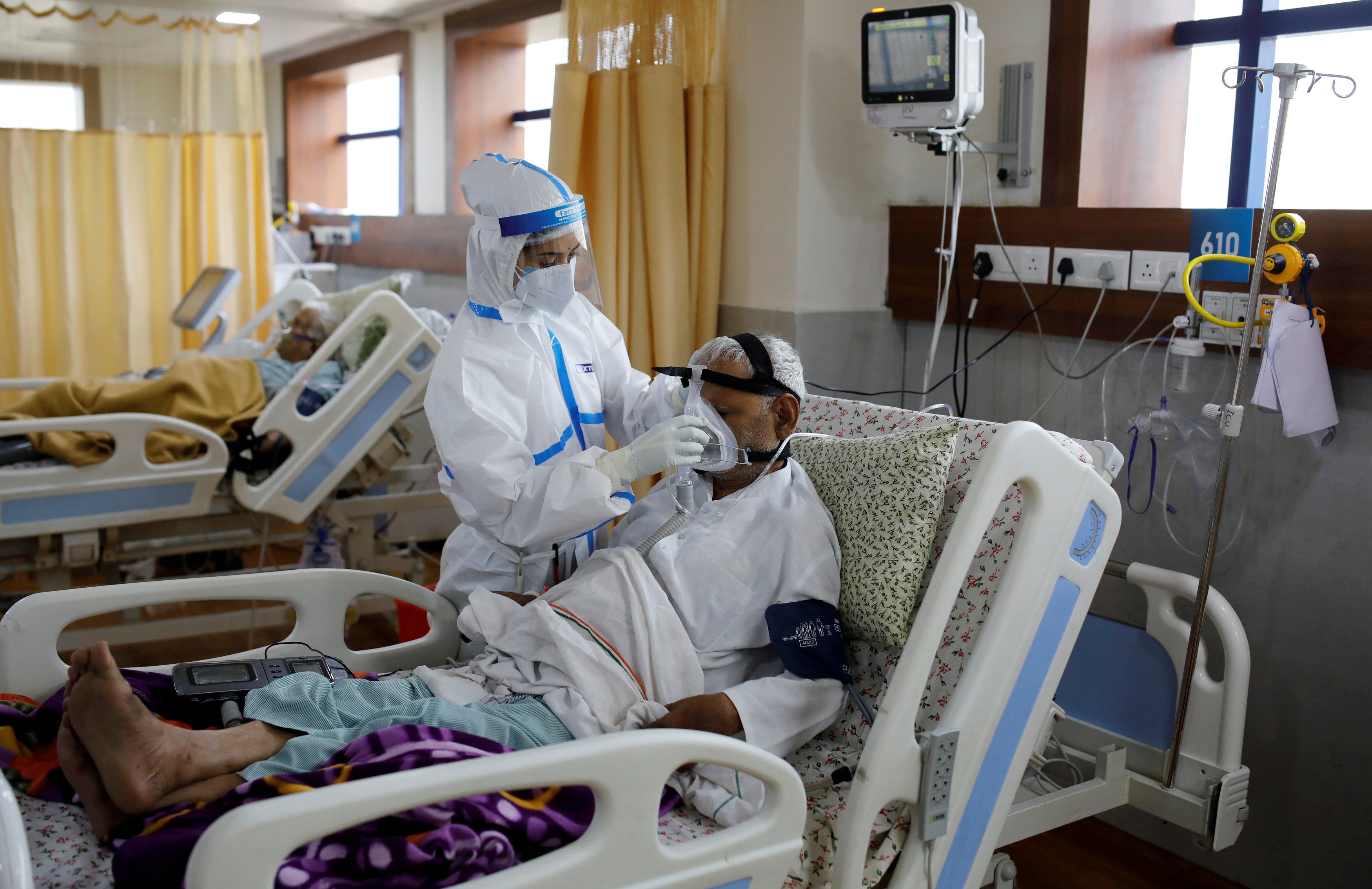Your support helps us to tell the story
From reproductive rights to climate change to Big Tech, The Independent is on the ground when the story is developing. Whether it's investigating the financials of Elon Musk's pro-Trump PAC or producing our latest documentary, 'The A Word', which shines a light on the American women fighting for reproductive rights, we know how important it is to parse out the facts from the messaging.
At such a critical moment in US history, we need reporters on the ground. Your donation allows us to keep sending journalists to speak to both sides of the story.
The Independent is trusted by Americans across the entire political spectrum. And unlike many other quality news outlets, we choose not to lock Americans out of our reporting and analysis with paywalls. We believe quality journalism should be available to everyone, paid for by those who can afford it.
Your support makes all the difference.India's confirmed coronavirus infections passed 5 million on Wednesday, still soaring and testing the feeble health care system in tens of thousands of impoverished towns and villages.
The world's second-most populous country has added more than 1 million cases this month alone and is expected to become the pandemic's worst-hit country within weeks, surpassing the United States, where more than 6.6 million people have been infected.
India's Health Ministry reported 90,123 new cases in the past 24 hours, raising the total to 5,020,359, about 0.35 per cent of the nation's nearly 1.4 billion people. Its record daily high of 97,570 cases was reported on 11 September.
The ministry said 1,290 more people died in the past 24 hours, for a total of 82,066, which is the third-highest toll in the world. Experts warned that India's fatality rate could increase in coming weeks with lockdown restrictions relaxed except in high-risk areas.
But authorities ruled out imposing a second countrywide lockdown as recoveries were growing at more than 78 per cent. Its fatality rate is 1.6 per cent, far lower than 3 per cent in the United States and Brazil, according to tallies by Johns Hopkins University.
Dr. Gagandeep Kang, an infectious diseases expert from Christian Medical College in the southern Indian state of Vellore, said the increase in cases in India was inevitable. But she said the country still has a chance to limit the growth through a strategy of testing and isolating affected places.
She said "the goal was for India to do enough testing to bring down the test positivity rate, or fraction of tests that test positive to less than 5 per cent or even less than 1 per cent."
Most of India's deaths are concentrated in its large cities — Mumbai, Delhi, Bengaluru, Chennai and Pune. But smaller urban centers in Mahrashtra such as Nagpur or Jalgaon have also reported more than 1,000 deaths.
Health Secretary Rajesh Bhushan said on Tuesday that only about 6 per cent of the coronavirus patients in India were on oxygen — 0.31 per cent on ventilators, 2.17 per cent on intensive care unit beds with oxygen and 3.69 per cent on oxygen beds.
Maharashtra state, with more than 1 million cases, remains the worst-affected region, followed by Andhra Pradesh, Tamil Nadu, Karnataka and Uttar Pradesh. These states account for more than 60 per cent of coronavirus cases in the country.
Referring to media reports that some hospitals in Maharashtra state are facing a shortage of oxygen cylinders, Bhushan said the supplies are adequate in the country, but state governments should monitor the situation.
"The problem happens when at a facility level, there is no inventory management," Bhushan said.
The Health Ministry said 155 health workers, including 46 doctors, have died so far due to Covid-19.
India's meager health resources are poorly divided across the country. Nearly 600 million Indians live in rural areas, and with the virus spreading fast across India's vast hinterlands, health experts worry that hospitals could be overwhelmed.
Nationwide, India is testing more than 1 million samples per day, exceeding the World Health Organization's benchmark of 140 tests per 1 million people. But many of these are antigen tests, which look for virus proteins and are faster but less accurate than RT-PCR, which confirm the coronavirus by its genetic code.
With the economy contracting by a record 23.9 per cent in the April-June quarter, leaving millions jobless, the Indian government is continuing to relax lockdown restrictions that were imposed in late March. The government in May announced a $266bn(£205 bn)stimulus package, but consumer demand and manufacturing are yet to recover.
A large number of offices, shops, businesses, liquor shops, bars and restaurants have reopened. Restricted domestic and international evacuation flights are being operated along with train services.
Schools will reopen for high school students for consultation with teachers next week.
Associated Press




Join our commenting forum
Join thought-provoking conversations, follow other Independent readers and see their replies
Comments